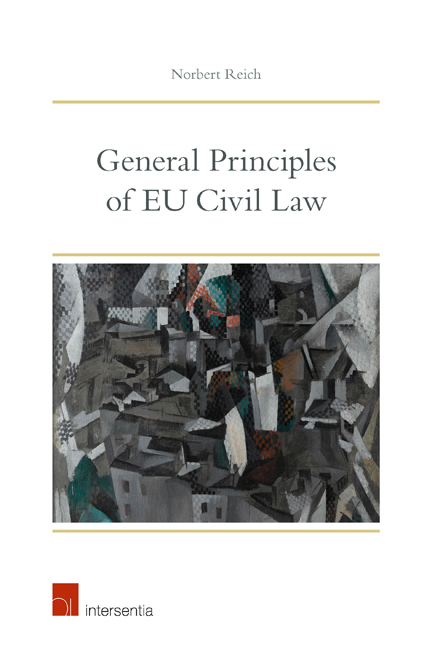Book contents
- Frontmatter
- Preface
- Contents
- Table of ECJ cases: alphabetical
- Table of ECJ cases: chronological
- Table of EU legislation
- List of abbreviations
- Introduction. What are General Principles of EU Civil Law?
- Chapter 1 The Principle of “Framed” Autonomy
- Chapter 2 The Principle of Protection of the Weaker Party
- Chapter 3 The Principle of Non-Discrimination
- Chapter 4 The Principle of Effectiveness
- Chapter 5 The Principle of Balancing
- Chapter 6 The Principle of Proportionality
- Chapter 7 An Emerging Principle of Good Faith and of a Prohibition of Abuse of Rights?
- Summary. Seven Theses and a Conclusion
- Index
Chapter 4 - The Principle of Effectiveness
Published online by Cambridge University Press: 22 November 2017
- Frontmatter
- Preface
- Contents
- Table of ECJ cases: alphabetical
- Table of ECJ cases: chronological
- Table of EU legislation
- List of abbreviations
- Introduction. What are General Principles of EU Civil Law?
- Chapter 1 The Principle of “Framed” Autonomy
- Chapter 2 The Principle of Protection of the Weaker Party
- Chapter 3 The Principle of Non-Discrimination
- Chapter 4 The Principle of Effectiveness
- Chapter 5 The Principle of Balancing
- Chapter 6 The Principle of Proportionality
- Chapter 7 An Emerging Principle of Good Faith and of a Prohibition of Abuse of Rights?
- Summary. Seven Theses and a Conclusion
- Index
Summary
ARTICLE 47 OF THE CHARTER AND ARTICLE 19 TEU: ANYTHING NEW?
This chapter will be concerned with a specific aspect of the constitutionalisation of civil law, namely the principle of effectiveness now written into Article 47(1) of the Charter, which reads:
“Everyone whose rights and freedoms guaranteed by the law of the Union are violated has the right to an effective remedy before a tribunal in compliance with the conditions laid down in this Article.”
Article 19(1) TEU puts the responsibility for “providing remedies sufficient to ensure effective legal protection in the fields covered by Union law” on Member States through the status of their courts of law as “Union courts”. A similar provision was contained in Article I-29(1) of the Draft EU Constitution, which was rejected in the Dutch and French referenda, but which later formed the basis of the TEU.
On a traditional reading, the constitutional “tandem” of Article 47 of the Charter and Article 19 TEU does not seem to contain anything new. It simply restates the existing EU acquis based on the so-called “procedural autonomy” of Member States to enforce Union rights, with some specific limitations developed under the so-called REWE/Comet case law to be discussed below (4.3). Its importance for civil law still remains to be discovered.
This chapter will take a different approach. The three strands of the argument examine the different ways in which the principle of effectiveness can be understood as a “constitutional principle” (0.7) in the case law of the ECJ:
– the first, rather more traditional reading understands effectiveness as an “elimination rule” (4.3);
– the second uses it as a “hermeneutical”, i.e. interpretative, principle (4.7); and
– the third is concerned with its “remedial” function (4.10).
The argument will be limited to ECJ case law related to civil law and is illustrated by case studies. This is a relatively new area of EU law, which goes some way to explaining some of its difficulties and inconsistencies. But it seems that a new, more useful and aggressive approach to the “tandem” Articles 47 of the Charter and 19 TEU can be discovered.
- Type
- Chapter
- Information
- General Principles of EU Civil Law , pp. 89 - 130Publisher: IntersentiaPrint publication year: 2013



